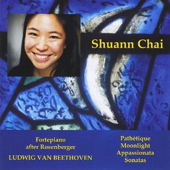
ESSENTIAL RECORDINGS

An impressive first release by Chinese-American pianist Shuann Chai, combined with an equally
impressive recording of a fortepiano built by restorer David Winston after a 1798 Viennese Michael Rosenberger, make
for a captivating and revelatory look at the inner workings of these famous Beethoven creations.
The catalyst for this recording, was a benefit concert in the All Saints Church in Kent, aimed to raise money needed to
restore and preserve its famous stained-glass windows by Marc Chagall, during which Shuann Chai performed all three
of these Sonatas in one recital. Quite an achievement by any standards but even more so when undertaken by
someone not yet hardened by years of concert touring and studio recording.
Her overview of these ubiquitous piano sonatas is dramatic, direct, and just as solid and trenchant as any of the big
name interpretations. For example, the final movement of the Moonlight reveals an urgency, a determination
in her playing too often lacking in others. And even though she's performing these on a fortepiano, a
period instrument that she champions, she still manages to make Beethoven's music sound larger than life. Not an
easy task when you consider that the fortepiano was the chronological link between the harpsichord and today's piano,
and somewhat sounds like a piano without a soundboard.
The instrument heard on this recording is a replica of exactly the type of keyboard instrument Beethoven himself would
have used when he composed these piano works. It exposes the textural quality of the harmonic complexities, and the
extremes in dynamics that Beethoven was trying to achieve, better than a modern piano. Also, because the instrument's
mechanism has less moving parts, the interaction between performer and object is much more direct. The musician
can't blur, camouflage or enhance his playing by hiding behind a grand piano's character. Whatever expressive touches
the music calls for, they have to be created from scratch on an instrument like this one, and Shuann Chai
clearly demonstrates that she is in full control of its output. On an instrument like this, you can't manipulate the sound.
It puts out what you put in. It's immediately obvious that Chai has poured body and soul into these sonatas, and the
outcome makes for a rewarding experience.
Once you've adjusted to the mechanical clicks and unusual sound of the keyboard, let Shuann Chai's authenticity take you
back to a Viennese concert hall circa 1798, and witness a 28 year old revolutionary composer thrill the audience with his
latest creation, the Op. 13 Pathétique Sonata.
Jean-Yves Duperron - December 2011